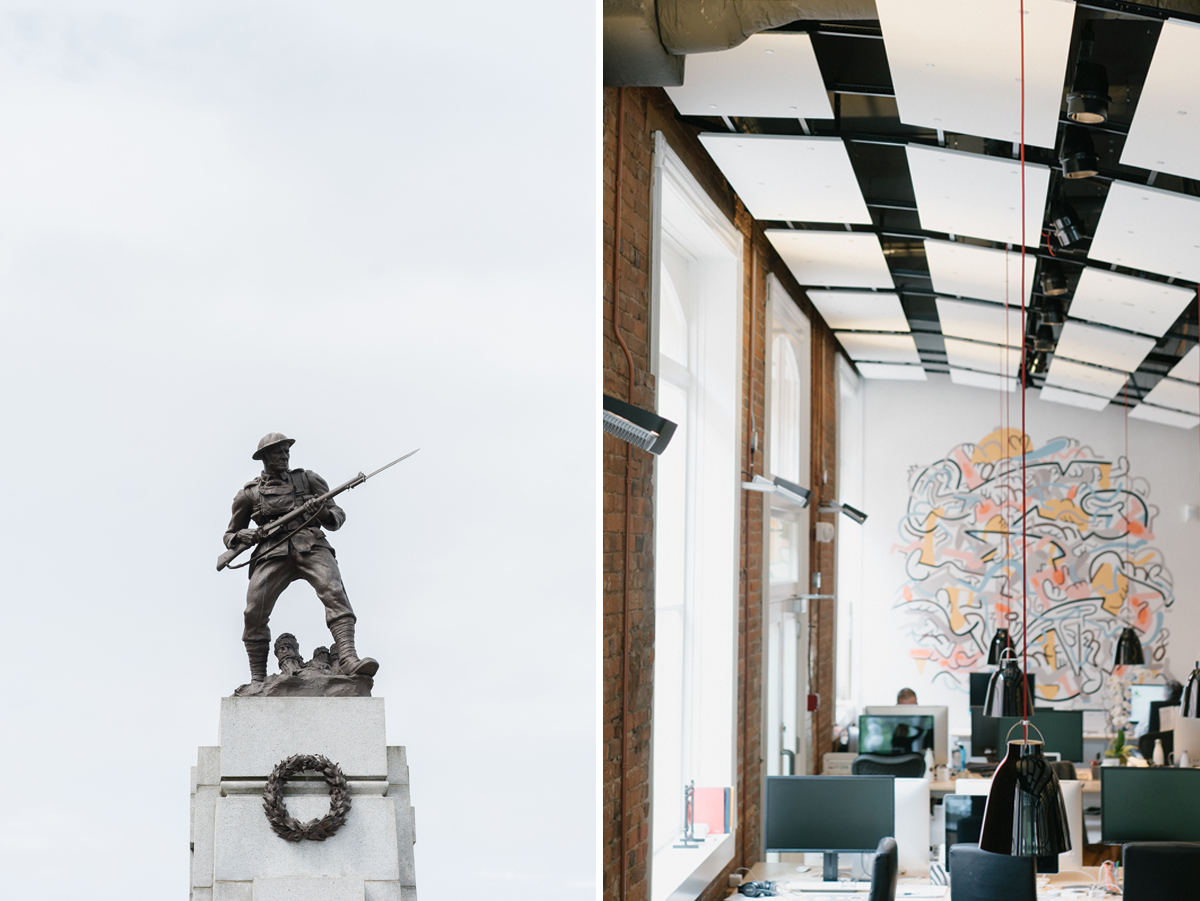Contents
Andrew Wilkinson’s career is an extraordinary manifestation of the adage “fake it ‘til you make it.”
When he first started out as a freelance designer, Wilkinson—a teenager at the time—masqueraded as the head of a large agency, cold called prospects, and booked $15,000 of work in his first month of operation.
Today, his company MetaLab has evolved into a true, large agency, known for building easy-to-use products for the likes of Slack, Google, Disney, Apple, and Uber. With a string of additional companies to his name, including Flow, Pixel Union, and Designer News, Wilkinson is firmly established as a respected voice within the modern entrepreneurial movement.
Not bad for a self-confessed “okay designer” who advocates Lazy Leadership.
Intrigued by his rise to the fore, we met with Wilkinson at MetaLab HQ. He shared his methodology for building a diverse portfolio of businesses across multiple industries, MetaLab’s unique approach to design, and his aversion to the Silicon Valley approach.
I started calling startups, saying “we” and “my team” and “we’ll get right on it,” when in reality it was just me in my underwear, in my apartment, in a panic.
You co-created your first website, MacTeens, when you were 16 years old. What drives a teenager to take on such a massive project?
When I was 15, I moved from Vancouver to Victoria. I didn’t know anyone here, and I had nothing to do, so I began teaching myself how to program, and I was deep into technology and Apple stuff. I started a blog focused on technology news, and it began attracting quite a bit of traffic.
My first crazy realization was that I could email any technology company and get them to send me free stuff. I would email them saying, “Hey, can I review your products?” And two days later they’d send Logitech speakers and laptops and other cool stuff that showed up at my door. That was the most amazing thing in the world for a teenage nerd. And then I started selling ads on the site. I was a teenager with a cracking voice on the phone with CEOs. I got to run a team. I got to interview Steve Jobs. It was a really cool experience.
Did interviewing Steve Jobs solidify your interest in design?
Me and four other reporters were invited for a tour of the Apple store and we didn’t know that Steve Jobs would be the one who was giving us the tour. We showed up—and there he was. I’m 17 and suddenly Steve Jobs gets out of a limousine and shakes my hand. It was bizarre. It’s not like I got to sit him down and really dive into his psyche or anything like that, but it was just really cool to be able to say I met him. I got to ask him a bunch of questions about the new products that they released and stuff.
You drop out of university well before graduating. What turned you off it?
With MacTeens going so well, and having access to all of these really interesting experiences, I decided I wasn’t going to go to university around the time I was graduating high school. When I finally got the courage to tell my dad, he slammed on the brakes of our rusty, old Volvo, totally freaked out, pointed at a gas station, and said, “You’re going to be working there if you don’t go to university.” He convinced me that it was imperative that I go to university. I ended up giving away my website and moving to Toronto to go to Ryerson Journalism School. Pretty much on day one I realized I was in the wrong place. The course was basically taught by a bunch of journalists who had recently been laid off from all the papers in Toronto. They didn’t paint a very pretty picture.

What did they say?
They basically said, “You’re going to make 35 grand for the rest of your life; you’re going to have to write hard news and you won’t be able to do any creative writing, and it’s going to take 20 years to any kind of managerial position or make any money.”
I knew that wasn’t right for me. I dropped out after three months, moved back here [to Victoria], and I had this awful job doing data entry at a local firm. One of their clients was a grocery chain, and my job was to go through the grocery chain’s catalogue every single week and, line by line, add all their products to their website. I would literally go through and go, “Okay, bananas, $2.59 on sale for 50% this week only.” I just typed that in. I tried to say to my boss, “Look, we can automate this process and I can spend, you know, one day a week doing this instead of four, and then I’ll be freed up to do more interesting work.” And my boss wasn’t having it. He basically thought I was slacking off. I got so frustrated, I ended up quitting on the spot.
I walked out of there with $250 in the bank. I was thinking I would go over to Google or something, and then I realized that, you know, I’m 19, I was in Canada, I don’t have a visa, no one is going to hire me, let alone Google. So I ended up deciding that I would freelance just to make money and pay my bills.
So what turned a 19-year-old data entry grunt into a famous designer?
Well, I realized that if I pretended to be an agency, I could probably charge more. So I came up with the name MetaLab. I took a bunch of photos of all my friends. I put them up on the website. And I started calling startups, saying “we” and “my team” and “we’ll get right on it,” when in reality it was just me in my underwear, in my apartment, in a panic. To my surprise, I landed about $15,000 of work in the first month. I landed two startups, one in New York and one in San Francisco. I started designing web apps, and we ended up doing really well in all of it.
A lot of companies that we started working with early on got acquired into large companies. So as they would get acquired, MetaLab would start working with the new companies. We ended up working with YouTube after one of our clients got acquired by them. Re-designing YouTube was super cool.
Over the years, we’ve basically gone from me in my underwear to a group of companies with about 200 employees in a variety of different industries. But we still have the agency business. Now we work with companies like Apple, Google, Disney, Walmart, Uber, Amazon—you name it. We’ve also designed startups like Slack, and worked with companies like Shopify and Tumblr really early on. And we’ve spun out multiple other businesses.
Let’s be honest: there are a lot of teenagers who drop out of university but don’t end up with your level of success. What were the core skills you were working with throughout all of this?
I was an okay designer. I was an okay front-end developer. But I was a good talker. I’ve always been very comfortable talking to people on the phone and email and all that kind of stuff. And, because I ran a website when I was 15, I’d basically been doing sales and management for five years before I started my company. I would say that a lot of people who start businesses like this usually do it because they love being a designer, and they’re a really good designer. But, often, a really good designer is not a really good communicator, or a really good salesperson, or business person. I’m not an exceptional designer, but because I’m a good talker I’ve been able to build a really great business. I know just enough about a couple different things.
I’m not an exceptional designer, but because I’m a good talker I’ve been able to build a really great business.

You’ve been a clever—cheeky, almost—entrepreneur from the start. For instance, you’re a master of strategic favors; you’ll build websites for clients for free and then offer your paid services for interface design. Is that kind of savvy nature vital to being successful in the web and design space?
I’m really pleased that you didn’t use the word “hustle.” But yes, definitely. I mean, that’s how we put ourselves on the map. We would do strategic favors. We did a blog design for the CEO of CollegeHumor, and we did that for free or for maybe $500. And through that, we got introduced to his friends and his network, and we got a whole bunch of work. I think it all just comes down to meeting people, and being useful to influential and interesting people, and maintaining those relationships. And then, at a certain point, we found we didn’t have to go to conferences any more, or do any kind of door knocking. Interesting work just keeps coming up, and we keep getting introduced to interesting people. So it’s been really cool. But there’s kind of a hunger [driving it]. People seem scared to do something simple, like write a really good email to someone interesting, or just to reach out and try to be useful to people. They don’t think very strategically about that stuff.
I think “strategic favors” sounds kind of douchey. I never did this expecting something. I was so excited to be working with someone cool. And, as luck would have it, they would always introduce me to their friends, their business associates, and we’d get work through that.
Is it really charisma and an outgoing nature that creates great businesses in the web space these days?
I would say when you’re doing client services, yes. When you’re not doing client services, no, it doesn’t matter. Because you could run a SaaS company without any charisma, as long as you can get your team motivated and excited. The difference with client services is that you’re always selling. If people don’t like you, no one works with you. And if people don’t trust you, no one works with you. All you have is your reputation and your brand.
I realize that my business has no competitive advantage. We just sell services. They’re services that are commoditized to some degree. But we rely on reputation and brand, so we do everything we can to constantly try and track that, to ensure that we maintain our reputation and continue to do exceptional work.
If people don’t like you, no one works with you. And if people don’t trust you, no one works with you.

You also run your companies in a very different way compared to many Silicon Valley businesses. You won’t take venture capital money, for instance. Why’s that?
I think if someone came to you and said, “Hey, would you like to buy this house? You’re going to have to pay your life savings, there’s a 93% chance that you’ll get nothing, you’ll never make any money, and this house will be worth zero in five years. There’s a 7% chance of making some money, and there’s less-than-1% chance of making a lot of money.” I don’t think many people would take that bet. I think that people fail to run the numbers when they’re taking venture capital. I have many friends who have been very successful taking venture capital and scaling. And there are certain business models that require it. But for me, in my business, I basically look at it as selling pick axes to gold miners.
Do you have any desire to be a Musk, a Zuckerberg, a Dorsey?
I think it sounds miserable. I’m very lifestyle focused. I don’t believe in changing the world. I think that’s a ridiculous thing. I think that if you don’t do it, someone else will. I really just want to be happy—wake up every morning and work with interesting people on interesting problems. And the money doesn’t really make a difference. The only reason why I want to make more money is because it adds independence and the ability to say “no” to things I don’t want to do, or not work with people who I don’t want to spend time with. I don’t need to come up with the next artificial intelligence product or something like that. I don’t know why. I just don’t. I’m not motivated that way.
Mark Nichols, a former consultant at MetaLab, wrote a Medium piece called “I Ain’t Scared of You Motherfuckers.” It was about not letting your clients dictate or cold logic dictate business decisions. What does dictate your business decisions?
A lot of it comes down to user pains. We try and look at everything not from just a client’s perspective—obviously that’s incredibly important—but from a user’s perspective. When we’re building a problem, we try and really figure out “What are the existing solutions?” and “How are they letting down users?” And then, how do we work backwards from pain, and then from pleasure as well? What makes someone light up and love using a product?
When we were doing Slack, that meant trying to think about creating a color scheme that felt playful. We really focus in on the user more than just the client. I would say that that’s a different way of looking at it.
A lot of people will try and make their clients happy, which produces sub-par work. Not to say we haven’t done that in the past. But whereas people used to come to us because their buddy referred them to us, people now come to us as experts. They know MetaLab, they know what we’ve built before, and they respect our opinion. So we’re able to be much more opinionated when we do projects.
The only reason why I want to make more money is because it adds independence and the ability to say “no” to things I don’t want to do.

Was designing Slack the project you’re most proud of?
It’s definitely one of the ones that has gone on to become the most successful, and it’s really cool for us too. We did the branding, the marketing site, the web app, the mobile app; the DNA of Slack is very much something that we contributed to. And so it’s very cool to see something so widely used. I’ll walk through a coffee shop and I’ll see three people using it. That’s been really exciting for us.
How vital then is design to a company’s “DNA,” as you say?
I think it’s just a piece of a puzzle, right? You can have great design and terrible copywriting. You can have great design and terrible development. It’s just another part of it, but I think it’s a very important one; design has the ability to define a product and make people feel things and get them hooked into it—but it’s not the be all and end all.
Is design always relevant, even to non-designers?
Oh, definitely. In the same way that development is relevant to designers. Without development you can’t build shit, so you might as well pay attention to it. It’s all interdependent.
I’m very lifestyle focused. I don’t believe in changing the world. I think that’s a ridiculous thing. I think that if you don’t do it, someone else will. I really just want to be happy—wake up every morning and work with interesting people on interesting problems.

You recently purchased the online community Designer News, and now you’re its publisher. Do you feel invested in the design community at large?
Yeah. I started out as a designer, so I always think about things from a design standpoint. You know the quote, “To a man with a hammer, everything looks pretty much like a nail.” Design is my hammer. So I go, “How can I make this more beautiful, simpler, easier to understand? How can I trigger emotions?” Whenever I look at any business or product, that’s how I think first and foremost. As I’ve had more and more experience in the business and had the opportunity to be an investor and start businesses outside of tech and invest in a wide variety of stuff, still, that’s where I always start. Even if I’m looking at a company completely outside of tech, I look at: how is it branded, what is the website like, what internal processes can be made simpler and easier to take in?
Does MetaLab have a fundamentally unique outlook on design?
We’re not very precious about it. A lot of agencies try and talk about how they do everything differently. The main difference between a lot of agencies and us is there are a lot of agencies out there that try and do many different things really well. We do one thing well: we build products. So if someone comes to us and they say, “How do we reinvent this market?” We say, “Oh, we don’t know. Go over there. Go talk to a firm that does strategy and come to us once you’re there.” We focus on building shit and nothing else; we are expert level with that. And the way that we build is quite unique. We don’t do a lot of scoping and planning, research and strategy, or anything like that. We really just jump directly into the problem.
Can you elaborate on the MetaLab approach?
We use a process that we call “skateboard, bike, car.” Basically, when you’re building a product, it shouldn’t be like building like a car, right? If you think about a car factory: you’re going to make the chassis, and then you’re going to put the wheels on. And then you’re going to put the top on and do the dashboard and everything else. It’s a slow process where the only [point when] you can enjoy the car—or the thing you’re building—is at the end, when it rolls off the production line.
What we’re trying to do is take very simple steps through a progression. So we build a minimum viable product (MVP). It’s like a skateboard. It’s the simplest form of transportation. You can mess around on it. It’s pretty fun. And then we add on and make it into a bike. We add more features to the MVP, and we iterate it. And then, finally, when we go and take a product to market, we have a car.
But the idea is that, the whole way through, you have tangible prototypes that you can fool around with and play with. Whereas a lot of people seem to do this thing where they basically say, “Okay, we’re going to build this thing and it’s going to take four months.” They go off into a dark room and then they come back. And often, if you do that, you end up with something that nobody likes, because real-world users haven’t used it. The team hasn’t used it. The client hasn’t used it. And so we try to get as quickly as possible to a prototype someone can actually hold it in their hands and fool around with.
Is working out of British Columbia an advantage or disadvantage to tech companies? Are you interested in moving to Silicon Valley?
Oh, it’s a huge advantage. We find that there’s a ton of untapped talent, especially in Victoria, because there’s way fewer technology companies here. We’ve been able to find some really phenomenal people. We’re also starting a Vancouver office. We have about 25 people in Vancouver right now, and we’re rapidly expanding that.
People we work with often don’t even know that we’re up here. So someone will say, “Hey, can you meet me in Union Square for coffee tomorrow? I want to work with you.” And we’ll just fly down there. They don’t even know we’re here.
Over the years we’ve basically gone from me in my underwear to a group of companies with about 200 employees in a variety of different industries.

Oh, really?
They might learn about it later on. But the cool thing is, even if we were in San Francisco, we would be working out of separate offices and getting the work done. So there’s really no difference between working with a company in San Francisco or in Victoria. In terms of cost of living and positive talent, I think it’s vastly superior.
What’s next for you?
Well, I don’t know. I mean, you could’ve asked me that at any point in the last five years, and I would’ve had no idea. I’m not quite happy to say that.
Is that part of your success, though? Making in-the-moment gut decisions about what feels right?
It’s not so much gut instinct. It’s more a “journey of a thousand miles begins in one step.” I just stare at my feet and I look up every once in awhile. I’m not super strategic. I don’t really think about the arcs of my companies or, say “You know, okay, I want to sell a business or I want to do X or Y within the next year.” For the next month or two months, I’m focused on hiring great people and doing great work.
It’s been over a decade now since your dad slammed on the brakes and said you had to go to university. What does he say now?
Oh, he shut up about that. I think it took about five years for him to realize that I knew what I was doing, and that I wasn’t going to bankrupt myself. My parents are pretty pleased with how it’s all turned out.

